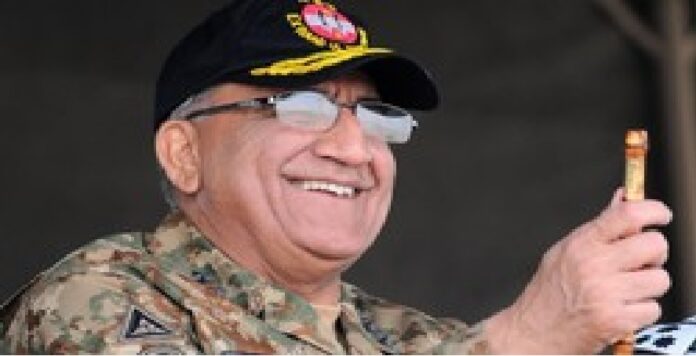By Rob Rowland
Pakistan’s economy is in great trouble and it is facing the worst time of its entire history. This country’s officials informed the IMF that the cost of debt servicing may rise to nearly Rs 5.2 trillion in this fiscal year, equaling more than half of this year’s (2023) total budget of Rs 9.6 trillion. However, on the other side we see, Pakistan Army generals enjoying their royal life without any concerns. The luxury life, which other countries’ military generals (even developed nations) can’t even imagine of .
It is quite interesting when we compare the salaries, pensions, perks and privileges of Pakistan Army with its arch-rival and neighbouring India, in view of the size of budget we find Pakistani military generals are appear members of royal families. Find hereunder a brief comparison:
| Rank | Salary Range (per month) | Allowances | Pension Range | Post-Retirement Facilities |
| Army General | India: INR 2,50,000
Approximately (3000 $ USD) |
Housing, Medical, Travel, etc. | India: =INR 1.38000 TO 2,00,000 – INR =2,50,000
(Approximately 1604$ to 2325 $ USD) |
Medical facilities, accommodation, security, staff
No land or plots |
| Army General | Pakistan: PKR
PKR 713,572 (Approximately 2500$ USD) |
Housing, monthly house allowance of PKR 2,96,000
monthly (1034$ USD)
utility allowance of PKR 1,22,000(425$ USD) monthly travel allowance of PKR 1,22,000 (425$ USD ) Medical, Travel, for all family members \ Security provided to him and his family |
Pakistan:
400,000 to PKR 600,000 PKR (1400 $ To 2100 $ USD Approximately) |
Medical facilities, accommodation, security, staff plus:
· Agriculture Land over 300 Acres · Commercial Plots · Residential House · Several Residential plots in different defence housing societies. |
| Lt. General | India: INR 2,29,500
(Approximately 2667$ USD) |
Housing, Medical, Travel, etc. | India: INR 1,23,000-1,50,000 – INR 2,00,000
Approximately 1600 to 2025 $ USD ) |
Medical facilities, accommodation, security, staff
No land or plots |
| Pakistan: PKR Basic Pay: PKR 616,742
Approximately(2156$ USD) |
Housing, Medical, Travel, etc.
Housing, monthly house allowance of PKR 2,96,000 monthly utility allowance of PKR 1,22,000(425$ USD) monthly travel allowance of PKR 1,22,000(425 $USD ) Medical, Travel, for all family members \ Security provided to him and his family |
Pakistan:
PKR 300,000 to PKR 400,000 per month (Approximately) 1050$ USD TO 1400$ USD) |
Medical facilities, accommodation, security, staff
+ · Agriculture Land over 250 Acres · Commercial Plots · Residential House · Several Residential plots in different defence housing societies. + ALLOCATION TO ANY INSTITUTE DIRECTOR, HEAD, CHAIRPERSON, in some cases appointments as VC IN ANY DEFENCE UNIVERSITY |
|
| Major General
(India) |
India: INR 2,29,500
(Approximately 2669$ USD) |
Housing, Medical, Travel, etc. | India: 1,38,000 – INR 2,30,000
(Approximately 1600 $ TO 2325$ USD) |
Medical facilities, accommodation, security, staff
NO land or plots |
| Major General
(Pakistan)
|
Pakistan:
Basic Pay: PKR 513,659 (Approximately 1796$ USD) |
Housing, Medical, Travel, etc. | Pakistan:
PKR 200,000 to PKR 300,000 per month. APPROXIMATELY ( 700$ to 1050 $ USD) |
Medical facilities, accommodation, security, plus
· Agriculture Land over 200 Acres · Commercial Plots · Residential House · Several Residential plots in different defence housing societies.
|
It is a matter of fact that the Pakistan army always remains reluctant to reveal the salaries, perks and privileges given to high-ranked officers. This issue had been raised many times but the army’s stance over these revelations was that it is a sensitive matter, which could become a clash of interests between the institutions. In a landmark move, in 2020, the Pakistan Information Commission (PIC) informed the defence ministry that information about income, income tax, assets, perks, privileges, post-retirement benefits and plots allotted to officers of the armed forces is public information and not sensitive. However, it is still categorised as classified, though unofficially. It is also observed that any journalist who reported wealth of military generals, beyond the known sources had to face stern consequences.
In recent history, we have heard several voices against the military General’s wealth and possessions. A research paper titled ‘Transparency in Military Budgeting: The Case of Pakistan’ published in the International Journal of Public Administration and Management sheds light on the issue of transparency in Pakistan’s defence budget. The paper discusses the need for greater transparency in disclosing the salaries and privileges of high-ranked army officers. It argues that without such transparency, it becomes difficult to evaluate the allocation and utilization of public funds within the military sector, undermining public trust and potentially leading to corruption.
In a report titled ‘The State of Transparency: Assessing Access to Information in Pakistan’, published by the Centre for Peace and Development Initiatives (CPDI), it is highlighted that the Pakistan Army’s lack of transparency regarding the salaries and privileges of high-ranked officers raises concerns about accountability and public trust. The report calls for the disclosure of such information to ensure transparency and prevent any potential misuse of public funds. It emphasizes the importance of adhering to Islamic principles and the Constitution of Pakistan, which emphasize transparency, fairness, and accountability in governance.
Pakistani military offers comprehensive services to its current and former members, often referred to as ‘womb to tomb’. Several scholars raised concerns about these royal privileges. In correspondence with the Research Directorate, Christine Fair, an Assistant Professor in the Security Studies Program at Georgetown University, indicated that the benefits offered to retired military personnel range according to the rank of the officer, which is quite high as compared to other countries.
In a report published by Immigration and Refugee Board of Canada, highlights that senior retired military officers are ‘perhaps the most privileged social group in Pakistan, ‘benefitting from free health care, pensions, commercial and residential land at ‘throw-away prices and often cushy civilian jobs. Senior political analyst Ayesha Siddiqa indicated that the Pakistan Military has an elaborate system of perks and privileges for their officer cadre.
Christina Fair has also indicated that retired officers enjoy pensions, plots, commercial and agricultural lands. Furthermore, their families, are offered ”separate and better hospitals, schools, social amenities and they are eligible to live in special ‘cantonments’ where all of the amenities are vastly superior to those available to non-military families. Ayesha Siddiqa similarly indicates that some of the best clubs, guest houses and other such facilities belong to the armed forces, not to mention the availability of health and educational facilities that are far better than those available for the civilian population.
According to a report published by Khaleej Times, the plots, houses, and other benefits that military officers receive after retirement are related to the time they spent in the army. According to military officials, an army officer is given an optional form on the first day of service to become a member of Army Housing. Under the code, when a military officer completes 15 years of service, he is entitled to a residential plot of land.
This question has been raised in the Supreme Court of Pakistan in 2018 and surprising facts emerged as heavy shocks for the honourable chief justice Qazi Muhammad Isa. He had given a verdict through which it is observed how ridiculously Pakistani high-level officers had grabbed, exploited and looted their homeland for which they have been supposed to be protectors.
According to the verdict of the Supreme Court of Pakistan, the laws govern all armed forces do not provide that they be given residential plots, commercial plots or agricultural land nor permit them to receive the same. Nevertheless, senior members of the Armed Forces get plots and agricultural lands and continue to be given additional plots and agricultural lands as they rise up the ranks.
If we go through the history, we find that the plot’s culture started by Gen Ayub but it was limited. However, when Gen Musharraf came to power, he bribed his officers with too much wealth in the shape of plots. When General Gracey was commanding Pakistan`s Army, General Mohammad Ayub Khan approached him with a request for a plot but he was rebuffed by the Army Chief; ironically a British officer preserved Pakistan`s land from a son of the soil. Shuja Nawaz in his book under the chapter – `United Pakistan: How to Break up a Country` writes, `the practice of multiple plots was to become common, giving rise to a new “Culture of Entitlement” that permeated both the military and civil bureaucracies and that would become embedded in Pakistan society`. The Constitution defines the service of Pakistan as both civil service and armed forces personnel are in the service of Pakistan; the Constitution creates no distinction between them. But in contrast to the constitution, only high-ranked army officers have this privilege to get the plots and lands and all other civil servants have been deprived to avail of this offer which is a clear violation of the constitution of Pakistan. The prevailing practice of granting State/public plots and land to members of the Armed Forces is contrary to the Constitution and the law.
The judiciary and the armed forces of Pakistan are patterned on the British model. Surprisingly, lands are not given to judges and the members of the armed forces in Britain, the US or any commonwealth country, with the singular exception of Pakistan. In the time when the subcontinent was ruled by the East India Company, and later when it came under the direct rule of the British Crown, British officers, soldiers and judges, whether deployed in the subcontinent or serving at home, were not bestowed land and could not enjoy such luxurious perks and privileges as the Pakistan army has been enjoying as a free state and desperately striving to become a democratic state.
The land given to these “Untouchables” who can’t be questioned, senior officers of the armed forces of Pakistan is not a bounty “out of captured land” nor has Parliament authorized its distribution. However, whoever raises questions on this injustice system of distribution of wealth, they are proclaimed as the “traitors” of the state.
Such an injustice continued to this day may not continue for long as the country stands on the verge of default. No efforts to this time appear on table to save the country from fast approaching default when all the privileged classes and categories may be deprived of such luxuriant life style.






